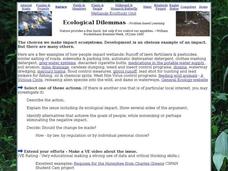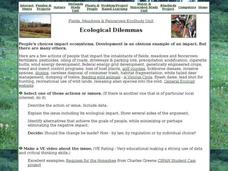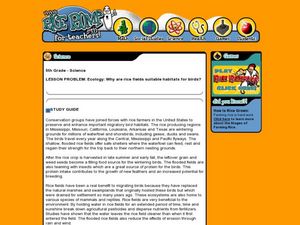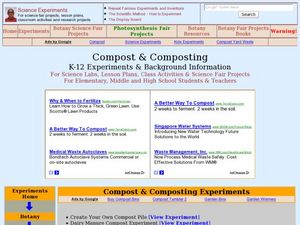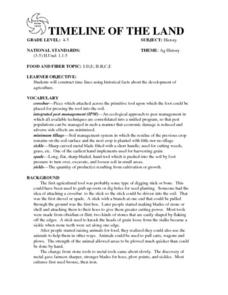Curated OER
Ecological Dilemmas in Wetlands
For this ecological dilemmas in wetlands worksheet, learners select a topic, use the links to websites for research, describe the topic, explain its impact on wetlands, identify alternatives and decide on possible changes. An...
Curated OER
Scavenger Hunt
Students explore area around schoolyard by participating in scavenger hunt, examine things that live there, such as noxious weeds, develop observation skills by using five senses, and find and identify ten to fifteen local, natural objects.
Curated OER
Prairie Restoration and Prairie Ecology
Students collect data as they identify and classify native prairie plants and insects. They create their own population study using a variety of sampling techniques to determine the population density of various species. Students...
Curated OER
Ecological Dilemmas
For this ecological dilemmas worksheet, learners read about people's impact on ecosystems. Students complete 3 activities that require them consider the negative impact humans have on their environment.
Curated OER
Where Do Weeds Grow Best?
Student design an experiment in order to determine where weeds grow the best. Through data collection and observations, they discover optimum conditions for weed growth, conditions that make it difficult for weeds to grow, and create...
Curated OER
Growing Vegetable Soup
Students use children's literature in order to think about the concept of creating a garden. This is done through conducting simple research about types of plants that could be grown in the area and how to care for them. Then the garden...
Curated OER
Landscape Garden Makeover
A project-based learning plan focuses on landscapes in the community. After identifying problems, such as dead trees or misplaced automatic sprinklers, learners design solutions, contact local organizations to fix the problems, and do...
Curated OER
Ecological Succession
Students examine succession in different communities. In this investigative instructional activity students study ecological succession and complete several assignments.
Curated OER
Amphipod Ecology
Students count amphipods under kelp wracks of varying ages to explain how long it takes for them to find their food source. They collect and represent the data.
Curated OER
Field Trip to the Watsonville Wetlands
Students explore the differences between food webs and food chains. In this wetland lesson students play a food web game and go on a scavenger hunt.
Curated OER
Poet-Tree (or shrub or forb)
Students write poetry to describe a noxious weed. They form a personal relationship with, and a better comprehension of weeds. Students explain what the basic elements of a haiku are. They describe a particular weed, and comprehend...
Curated OER
Ecology: Why Are Rice Fields Suitable Habitats for Birds?
Fifth graders discover the uses for rice by reading about the habitats of certain birds. In this agriculture lesson, 5th graders research birds from the Gulf Coast and California and their reasons for living in rice fields. Students...
Curated OER
Food Chain/Food Web
Students explore ecosystems. In this ecology lesson plan, students read an article explaining ecosystems. Students create a visual organizer with index cards using components of various ecosystems.
Curated OER
Compost and Composting Experiments
Students investigate the composting process through a variety of experiments. In this ecology lesson, students discuss the benefits of composting. They examine how compost affect plant growth.
Curated OER
Drawing on Kenaf
Students explore kenaf, a tree-free paper. In this environmental issues lesson, students draw pictures following a presentation about the origin and "eco-friendly" nature of kenaf.
Curated OER
Composting
Using 2-liter bottles, junior ecologists create composting tubes in which they place nitrogen-rich and carbon-rich materials. They observe what changes occur over two weeks' time. Provide more specific direction to your class as to what...
Curated OER
Why Do Geese Fly South For the Winter?
Fifth graders examine migration by tracing animal migration routes on a map. In this animal life lesson, 5th graders observe a map of North America and read about the migration patterns of geese. Students trace the path most geese take...
Curated OER
Information Fluency Unit
Fourth graders, after defining the task and searching for some creative strategies, role play being a Park Ranger who tries to save Big Bend from being removed from the National Park system in Texas. They support the keeping of Big Bend...
Curated OER
Flipbook Succession
Students review succession charts for their native area before going to an outside site to view the changes. At the site, they follow the transect line and observe the changes in the plant life. They draw the changes on note cards that...
Curated OER
Advanced Critical Reading - Columbian Exchange
In this critical reading worksheet, students read a short passage about the Columbian Exchange and then answer questions based on the reading. Students answer questions by making inferences, determining author's point of view and use...
Curated OER
How do rice farmers make good use of the land they use for planting rice?
Second graders discuss how farmers grow rice. In this rice growing lesson, 2nd graders see the optimal condition for land in order to grow rice. They experiment with clay and garden soil to see which holds water better.
Curated OER
What are rice farmers doing to help the environment with their water-filled rice fields?
Third graders research rice fields. In this rice fields instructional activity, 3rd graders discuss how fields contribute to the environment by providing an important food source for birds. They find the benefits of rice fields to water...
Curated OER
The Cycle of Restoration
Students describe what is meant by restoration cycle. In groups, they create a poster to show the cycle of restoration work. After presenting their poster, they discuss the actions that can be done for each season. To end the lesson,...
Curated OER
TIMELINE OF THE LAND
Learners construct time lines using historical facts about the development of agriculture. Students research specific dates and events and report their findings to the class. Learners tape or glue the sections together sequentially in a...


